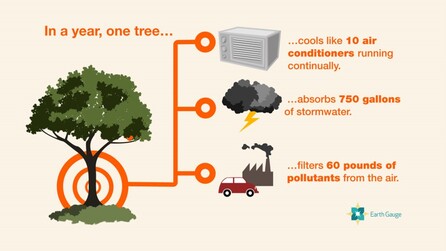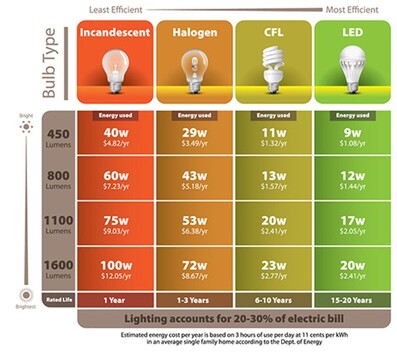SAVING ENERGY STARTS AT HOME

Reducing your energy use helps the environment by reducing CO2 and other emissions and can substantially reduce your yearly utility costs. Some energy saving tips cost nothing up front, and even those with up-front costs can have a big payoff over time both for the environment and your budget. Here are steps you can take right now to start saving energy:
- Adjust thermostat settings – During the heating season, it is recommended to keep the daytime temperature at or below 68°F and then set it even lower at night. During the summer, the recommendation is for 78°F or higher. And when you are away from home you can set the temperature several degrees warmer or cooler depending on the season. Programmable thermostats can help in this regard. Check out the details and note some exceptions to these rules based on the type of heating system at: Programmable Thermostats | Department of Energy
- Use passive solar heating in winter and block sun in summer - In the winter let the sun in during the day for solar heating and draw shades at night to reduce heat loss. In the summer, block sun from windows on the east and west sides of your house. Planting native deciduous trees around your house helps block sunlight in summer and will allow the sun in after trees lose their leaves. Plus, trees provide natural cooling.
- Wash clothes and dishes wisely – Wash only full loads; use cold water for laundry when possible; air dry dishes rather than use heated dry setting. (Saves both water and energy)
- Reduce lawn area in your yard, reduce power tool use, and use electric equipment – Increasing natural areas mulched with leaves in your yard will cut down on lawn mower use and support a better habitat for other wildlife. When working in the yard consider using hand tools instead of powered ones, e.g., a rake vs. a leaf blower, and get more exercise as a side benefit! Convert to battery operated or corded electric equipment for lawn mowers, leaf blowers, hedge trimmers, and string trimmers.

- Use energy-saving light bulbs – LED bulbs are the best all-purpose bulbs for energy savings, and they’re quickly getting cheaper. Compact fluorescent bulbs also save energy and are cheaper up-front, but they can’t be dimmed and will wear out prematurely if turned on and off frequently.
- Better insulate your house - Make sure you have adequate insulation, especially in the attic. Add weather-stripping as needed around doors and windows and consider insulation kits for electrical outlets and switches on exterior walls. If replacing windows use double-paned Low-E windows.
- Add Solar Panels to Your House - If your house is properly situated for solar panels, adding them is a great way to use free energy from the sun to generate electricity. Contact a local supplier of solar panels for feasibility and estimates and to find out what rebates may be possible through Duke Energy and NC and Federal programs.
- Heat Pumps - When it is time to replace your A/C and gas furnace, consider switching to a heat pump. Heat pumps both cool your house in summer and heat your house in winter using only electricity. Thus they have no local emissions like a gas furnace does. Advances in technology have improved the ability of heat pumps to operate in lower temperatures so they are well suited for our relatively mild winters.
See more on these ideas and additional ideas at Energy Saver a Department of Energy website.
To contact the Eco Ministry with questions, get on our Friends of the Eco Ministry for the Earth email list, or explore joining our committee send an email to [email protected].
